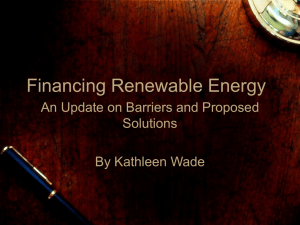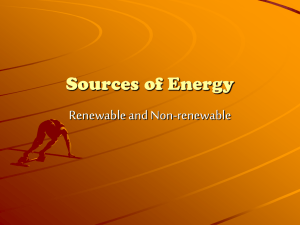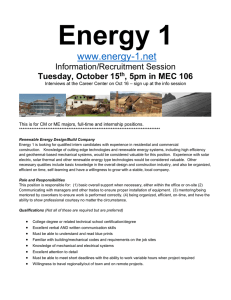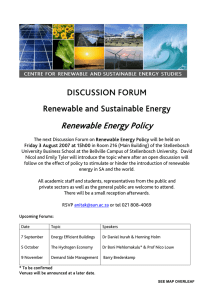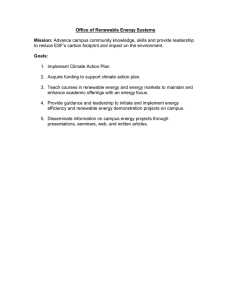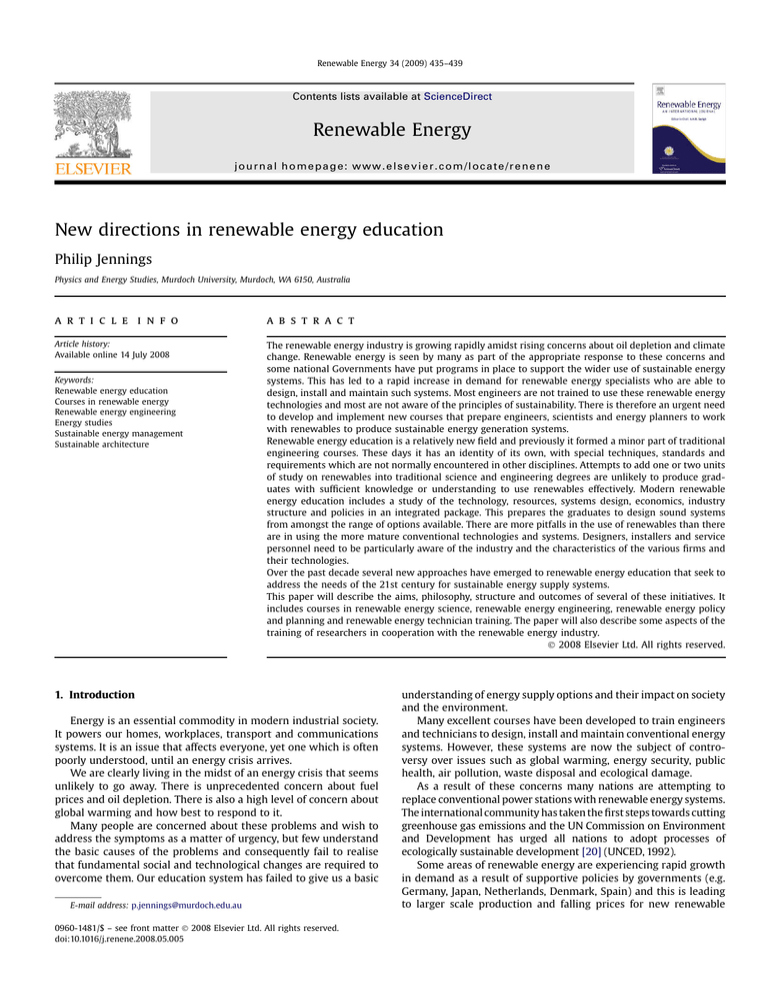
Renewable Energy 34 (2009) 435–439
Contents lists available at ScienceDirect
Renewable Energy
journal homepage: www.elsevier.com/locate/renene
New directions in renewable energy education
Philip Jennings
Physics and Energy Studies, Murdoch University, Murdoch, WA 6150, Australia
a r t i c l e i n f o
a b s t r a c t
Article history:
Available online 14 July 2008
The renewable energy industry is growing rapidly amidst rising concerns about oil depletion and climate
change. Renewable energy is seen by many as part of the appropriate response to these concerns and
some national Governments have put programs in place to support the wider use of sustainable energy
systems. This has led to a rapid increase in demand for renewable energy specialists who are able to
design, install and maintain such systems. Most engineers are not trained to use these renewable energy
technologies and most are not aware of the principles of sustainability. There is therefore an urgent need
to develop and implement new courses that prepare engineers, scientists and energy planners to work
with renewables to produce sustainable energy generation systems.
Renewable energy education is a relatively new field and previously it formed a minor part of traditional
engineering courses. These days it has an identity of its own, with special techniques, standards and
requirements which are not normally encountered in other disciplines. Attempts to add one or two units
of study on renewables into traditional science and engineering degrees are unlikely to produce graduates with sufficient knowledge or understanding to use renewables effectively. Modern renewable
energy education includes a study of the technology, resources, systems design, economics, industry
structure and policies in an integrated package. This prepares the graduates to design sound systems
from amongst the range of options available. There are more pitfalls in the use of renewables than there
are in using the more mature conventional technologies and systems. Designers, installers and service
personnel need to be particularly aware of the industry and the characteristics of the various firms and
their technologies.
Over the past decade several new approaches have emerged to renewable energy education that seek to
address the needs of the 21st century for sustainable energy supply systems.
This paper will describe the aims, philosophy, structure and outcomes of several of these initiatives. It
includes courses in renewable energy science, renewable energy engineering, renewable energy policy
and planning and renewable energy technician training. The paper will also describe some aspects of the
training of researchers in cooperation with the renewable energy industry.
Ó 2008 Elsevier Ltd. All rights reserved.
Keywords:
Renewable energy education
Courses in renewable energy
Renewable energy engineering
Energy studies
Sustainable energy management
Sustainable architecture
1. Introduction
Energy is an essential commodity in modern industrial society.
It powers our homes, workplaces, transport and communications
systems. It is an issue that affects everyone, yet one which is often
poorly understood, until an energy crisis arrives.
We are clearly living in the midst of an energy crisis that seems
unlikely to go away. There is unprecedented concern about fuel
prices and oil depletion. There is also a high level of concern about
global warming and how best to respond to it.
Many people are concerned about these problems and wish to
address the symptoms as a matter of urgency, but few understand
the basic causes of the problems and consequently fail to realise
that fundamental social and technological changes are required to
overcome them. Our education system has failed to give us a basic
E-mail address: p.jennings@murdoch.edu.au
0960-1481/$ – see front matter Ó 2008 Elsevier Ltd. All rights reserved.
doi:10.1016/j.renene.2008.05.005
understanding of energy supply options and their impact on society
and the environment.
Many excellent courses have been developed to train engineers
and technicians to design, install and maintain conventional energy
systems. However, these systems are now the subject of controversy over issues such as global warming, energy security, public
health, air pollution, waste disposal and ecological damage.
As a result of these concerns many nations are attempting to
replace conventional power stations with renewable energy systems.
The international community has taken the first steps towards cutting
greenhouse gas emissions and the UN Commission on Environment
and Development has urged all nations to adopt processes of
ecologically sustainable development [20] (UNCED, 1992).
Some areas of renewable energy are experiencing rapid growth
in demand as a result of supportive policies by governments (e.g.
Germany, Japan, Netherlands, Denmark, Spain) and this is leading
to larger scale production and falling prices for new renewable
436
P. Jennings / Renewable Energy 34 (2009) 435–439
energy systems. Simultaneously the prices of some fossil fuels are
rising and this is creating a more attractive market for renewables.
In the last five years there has been a worldwide boom in the wind
industry and solar PV power is thriving also in Western Europe.
However, this rapid growth has exacerbated the problem of
a serious shortage of skilled professionals, with experience in renewables. The type of person in demand includes designers, installers, service and sales representatives, policy analysts, scientists,
engineers, teachers and researchers. Without them the quality of
systems may be compromised and the demand for renewables may
be adversely affected as a result [6].
A recent survey of users of hybrid remote area power supply
systems (RAPS) found that only two thirds of them were in working
order at the time of the visit. Many users expressed disappointment
with the product and many said that better education and training
of the users and installers was essential [8]. Poor quality systems
and unrealistic expectations of users can give renewable energy
systems a bad reputation and lead to market rejection of the
product. This is an issue that education and standards can effectively help to address.
However, the surge of demand for renewable energy systems
over the past five years has caught us unprepared. Few expected
such a rapid increase in demand and few had been planning to develop the capacity to train the professional people needed to launch
the industry into this new phase. As a result many firms are unable
to recruit people with the full range of skills required to design and
implement sustainable RE-based power generation systems.
Now that it is clear that a fundamental shift in energy markets is
under way, a major effort is developing to train the new professionals needed to introduce the new technologies. These people
are not the electrical engineers of yesterday, with a slightly different training. They are a new breed who understand the new
technologies and the appropriate roles for them in the society of
the future. They require a broader training in social, economic and
environmental issues than the current professionals who design
and operate today’s conventional power supply systems [4].
training of people who will provide advice and assistance to
future customers of the industry.
Experience shows that those firms that have given adequate
attention to these issues have thrived in the highly competitive,
high technology market place, while many of those that have ignored the need to invest in information and education have failed
in spite of having good products for sale.
3. The educational needs of the RE industry and society
As a result of our surveys and enquiries, we have identified the
following needs for renewable energy education [7]:
retraining of professionals who wish to move into the renewable energy industry;
retraining of technicians and tradespeople who wish to work in
this field;
initial training of scientists and engineers to design and
develop new RE systems;
training in renewable energy technology and policy for financiers, investors and policy analysts;
short, in-service, professional development courses on aspects
of renewable energy technology and policy;
lessons and resources for schools on energy issues; and
contemporary information about renewable energy technology for the general public.
Such information and training should not be confined to technology or policy issues. Because of the context in which renewable
energy is developing, it is essential that training should address
economic, social and environmental issues arising from the technology as well. Renewable energy systems are expected to provide
sustainable solutions to energy supply requirements. Therefore it is
essential that designers of such systems are fully aware of the
philosophy and practice of ecologically sustainable development
[6,2,16].
2. The role of education in the renewable energy industry
4. New approaches to renewable energy education
Education has a vital role to play in the development of a sustainable society. It is a powerful agent of social change, it raises
awareness of new developments, it provides training for the
professionals and it trains researchers who will develop the next
generation of systems and devices.
In addition community education creates confidence in the new
products and trains the public to use them effectively. The need for
education of the community and the vital role it plays in market
development and in building confidence in renewable energy has
often been neglected by the renewable energy industry. Education,
however, plays a central role in the development of new high
technology industries as the examples of the computer industry
and the aircraft industry clearly illustrate.
Education also has a crucial role in the development of the renewable energy industry [4]. It is not the only ingredient needed for
success, but it performs several vital functions including:
promotion of greater public awareness of the technology;
development of consumer confidence in the technology;
training of technical support staff, who are essential for designing, installing and maintaining high quality renewable
energy systems;
initial training of engineers, scientists and researchers who will
develop new systems, devices and technologies for the industry;
training of policy analysts who are knowledgeable about the
industry and are able to produce effective policies for industry
development; and
Over the past decade there have been several innovative developments in renewable energy education that attempt to address
the needs of industry and the public aspirations for sustainability
and greenhouse gas abatement. There have been a number of
important renewable energy education initiatives in Australia in
recent years some of which are internationally significant. I will not
attempt to review this entire field but I will focus on several key
examples of new approaches to renewable energy education.
4.1. Technical education
The Brisbane and North Point Institute of technical and further
education (TAFE) has offered a Certificate IV in Renewable Energy
Since 1988. Trevor Berrill and colleagues at BNPIT have produced
learning packages to support this course. The Business Council for
Sustainable Energy (BCSE) supports this course as the preferred
pathway to accredit industry system designers and installers. These
materials are used in a number of TAFE colleges across Australia.
They have also converted their learning package to a flexible
learning format to accommodate short courses and distance education. The BNPIT package has been adopted nationally by the
National Training Authority and this has greatly assisted the renewable energy industry by providing a thorough, high-quality and
nationally-accredited package for training the additional technicians and tradespeople needed to support the growth of the
industry.
P. Jennings / Renewable Energy 34 (2009) 435–439
This package is not a conventional engineering technology or
electrical trade course with a few add-ons relating to renewables
but a completely new approach that addresses renewable energy
systems and their design, installation and maintenance. It was
developed in consultation with the renewable energy industry
around Australia. Course modules were written by renewable energy experts with industry development committees overseeing
the final syllabus. Such courses are essential to ensure that we have
an adequate supply of well-trained tradespeople who can design,
produce and maintain reliable and cost effective systems. High
quality educational packages of this type are as important as the
technology itself for ensuring quality of the product and success of
the industry. Further information about this course is available at
http://www.bn.tafe.qld.gov.au/.
4.2. Energy studies
Murdoch University began offering a postgraduate diploma in
energy studies in 1992. This was aimed at graduates who wished to
shift their career path into renewable energy technology, energy
efficiency or policy. The postgraduate diploma in energy studies
was developed for both on-campus and external study to cater for
the needs of busy professionals who could not attend classes during
work hours.
Energy studies is a new interdisciplinary area which aims to
train professionals to work in technology or policy areas. It equips
them with skills in technology, engineering, economics, management and environmental science to enable them to plan, design,
evaluate or research energy supply and use issues in the context of
ecologically sustainable development. Further details of the course
structure and outcomes are provided elsewhere [3,5]; http://
energy.murdoch.edu.au/.
In the late nineties the Postgraduate Diploma in Energy Studies
and Master of Science in Renewable Energy were made fully
available on-line and no on-campus attendance was required.
These courses now attract significant numbers of external students
from throughout Australia and overseas. The on-line option is
extremely popular with both external and on-campus students and
regular surveys of the students have shown high levels of
satisfaction with the online delivery. Many of the graduates of these
courses have been successful in changing their career paths and
have obtained interesting new jobs in the renewable energy
industry or in public service agencies concerned with energy or
greenhouse policy [5].
The success of these courses has led to international demand for
them and arrangements are now in place to offer them via licence
agreements. Massey University in New Zealand offers the Murdoch
Masters units and contributes two units of its own to Murdoch
students for online study.
In 2002 a new undergraduate course in Energy Studies was
introduced at Murdoch University and this has also proven popular,
particularly in combination with courses in physics, renewable
energy engineering and sustainable development. In 2006 the
name of the undergraduate course was changed from Energy
Studies to Sustainable Energy Management to better reflect its
content.
4.3. Photovoltaic engineering
The Key Centre for Photovoltaic Engineering at the University of
New South Wales, led by Professor Stuart Wenham, opened for
business in 1999. One of its key objectives is to offer a new type of
engineering degree devoted to solar energy and photovoltaic engineering. The first intake of students into this course occurred in
2000. This campus-based course contains a blend of traditional
engineering subjects together with new units in areas such as PV
437
design and manufacturing, grid connected and building integrated
systems, wind power systems, biomass conversion, solar thermal
and applications of these technologies. Students also have some
freedom of choice to select areas of specialisation and to enrol in
double degrees to enhance their employment opportunities. This
course aims to address the industry needs for engineers to research,
design and install major new renewable energy systems, particularly those based on photovoltaics [18].
4.4. Renewable energy engineering
Murdoch University’s School of Engineering offers a campusbased course in renewable energy engineering which commenced
in 2001. It covers traditional engineering subjects plus major renewable energy technologies such as wind, biomass, solar thermal
and photovoltaics, and their applications. This course was initiated
at the request of Western Power Corporation, who perceived a need
for renewable energy engineers to support its program of
development of renewable energy technology for green power and
the 2% mandatory renewable energy target. The course was
designed by staff from Murdoch University, Western Power
Corporation and the University of NSW. It complements the course
in Sustainable Energy Management, also offered by Murdoch
University, and the two form a popular double degree covering
many aspects of sustainable energy [19].
4.5. Environmental architecture
In response to requests from graduate architects for an advanced
course covering the principles of energy efficient buildings and
passive solar design, Murdoch University introduced a Masters by
coursework in Environmental Architecture in 2006. This course is
closely related to other courses in renewable energy and sustainable development, also offered by Murdoch University. It will be
offered initially for on-campus study only, but once it is fully
developed it will be offered on-line to the international market.
Further details are available in the paper by Baverstock and Parker
[1] and from http://energy.murdoch.edu.au.
4.6. Short courses
The rapid development of renewable energy technology and the
changing market conditions have produced a demand for specialist
short courses on topics such as renewable energy technologies,
system design, maintenance, installation, power quality, applications and energy policy and economics. Industry bodies such as the
Business Council for Sustainable Energy (BCSE) and the Electricity
Supply Association of Australia (ESAA) have provided such courses,
as well as private conference organizers. However, as the demand
has grown, several Universities have also entered this field. The
University of Melbourne offers short courses in renewable energy
for development. The University of NSW and Murdoch University
have offered short courses in PV applications and RAPS system
simulation. Curtin University of Technology has offered short
courses on power quality, solar water pumping and passive solar
design.
Murdoch University’s Research Institute for Sustainable Energy
(RISE) also offers short courses and has an extensive web site
with many educational materials that students and teachers can
access and use, free of charge at http://www.rise.org.au/info/
education/.
These activities are all regarded as an important part of market
development for the renewable energy industry and they are
generally well supported by the public [3].
438
P. Jennings / Renewable Energy 34 (2009) 435–439
5. New techniques for renewable energy education
Because of the urgent need for on-the-job training as well as the
conventional face-to-face training in renewable energy we have
utilised modern educational technology to reach a wider audience.
The World Wide Web provides an excellent vehicle for teaching
students off campus. It is well suited to the needs of professionals,
who cannot attend classes on campus as well as schoolteachers,
students and consumers who wish to access information from their
homes and workplaces. We have been able to provide high quality
materials to schools via Internet sites and CDROMs. These materials
include lesson plans, information files, demonstrations and links to
other relevant Internet sites. Because students and teachers are
generally familiar with the World Wide Web they can readily access
these materials without the need for assistance from our small staff.
This ensures efficient dissemination of information about renewables to a global audience [17].
We have also used the World Wide Web for delivering University courses in energy studies and renewable energy to a national
and international market. The team at BNPIT has also developed
their TAFE courses for on-line international delivery. Our experience has demonstrated that the Internet is a powerful and effective
tool for distance learning [9,10,11,14]. It provides a wealth of resources for isolated students and most of this information is very
up-to-date. The Internet courses can be studied wherever the students are and at a time and pace that suits them. Email also enables
students to submit queries and assignments from anywhere in the
world and receive rapid feedback from their instructors.
We have also developed ‘‘picture book’’ laboratory sessions for
isolated students who cannot attend on campus. These enable
them to learn the techniques of data analysis and experimental
design, although they miss out inevitably on some of the manual
skills involved in collecting their own data. However, for postgraduate students this is less of a problem than it would be for
undergraduates because most of them already have extensive
practical experience in their own fields [14].
For those students who do not have Internet access, or for whom
it is costly or unreliable, we have provided courses on CDROM. The
University of NSW is also using this medium effectively in their
university level and short course training.
There are some disadvantages of the Internet compared to
face-to-face teaching [12,13,15]. For example students do not have
direct access to their lecturer and cannot enjoy the interaction
that occurs in a conventional tutorial. However, many part time
and external students have never had these privileges and the
Internet now provides them with a wealth of resources and quick
feedback from experienced staff when they encounter difficulties.
Also WebCT offers the students the opportunity to interact with
other on-line students via discussion groups and these are very
useful for facilitating learning. So popular is this mode of study
amongst professionals that over 80% of the students enrolled in
our postgraduate diploma and M.Sc. have chosen to study in this
mode. Most undergraduates prefer conventional classroom
teaching in their first year of study, but they also soon realise that
the Internet provides them with access to a wealth of information
and a convenient way to submit assignments to their instructors.
6. Future trends in renewable energy education
As the renewable energy industry develops, as a result of
technological advances and market demands, there will be a substantial increase in demand for trained professionals. It is crucial to
the success of the industry that we maintain the highest standards
of performance and efficiency so that consumer confidence will
continue to grow and we can shed forever the image that renewables are unreliable and only of limited value in real power
generation systems. There have been too many occasions in the
past where renewable energy systems have failed to achieve the
level of performance expected by the customer. In some cases this
was due to misrepresentation by sales persons but in many others it
was due to poor quality design, installation or maintenance. Such
failures damage the reputation of the industry and can in serious
cases lead to rejection of the technology. Nuclear power is a good
example of how a promising new technology has failed because of
unsolved technical and social problems and inadequate training of
operators and designers.
Education and standards are the keys to quality renewable energy systems and market confidence. Education provides courses to
train professionals and it provides information to consumers about
the technology and its performance. Quality is also essential in
educational products and in many fields professional bodies keep
a watching brief on course content and the qualifications of the
instructors. This has not happened to any great extent so far in
renewable energy but it is now timely to consider appropriate
accreditation procedures for courses.
The formal education system is unlikely to be able to keep
pace with the needs of the renewable energy industry during the
period of rapid growth that lies ahead. Therefore it will be necessary to use modern educational technology to provide in-service training for professionals who wish to enhance their
knowledge of various aspects of renewable energy. They will want
access to advanced award courses and to short courses from time
to time as lifelong learning becomes an integral part of modern
industry. The renewable energy field is developing so rapidly that
the short training course area is likely to be crucial to the needs of
industry over the next 20 years. Even recent graduates will need
to update their knowledge on the job and this will be done via
continuing professional education courses using flexible learning
packages.
Many countries are now realising the need to move rapidly into
renewable energy and they are seeking courses that meet their
needs. The Internet has created a global market in courses and
institutions are competing strongly to supply appropriate training
packages to meet the needs of international customers. There is
likely to be a large demand for specialised short courses on areas
like design and installation of roof top systems, RAPS system
design and installation, renewable energy systems maintenance,
power quality for renewables and energy policies. The TAFE
courses for designers, installers and maintenance personnel will
also have wide application as they address the immediate needs
of nations wishing to install more renewable energy systems. Renewable energy education is poised to develop a significant international market with a large export potential and good return
on investment.
User education is likely to be another area where considerable
work is required. Renewable energy technology is novel and users
will need training to select and use it effectively. The computer
industry and the automobile industry have both recognised the
vital link between education and market development and have
addressed it effectively to ensure that consumers are given the
knowledge they need to make wise choices and to get the best
value from their investment. The renewable energy industry will
need to do likewise if it wishes to reap the full benefits of public
support and the desire of people to find safe, sustainable energy
systems for the future.
High quality engineering and market demand are clearly essential for the prosperity of the renewable energy industry, but
they are not sufficient. Unless the systems are meeting consumer
needs, there will be an adverse reaction and the demand will decline. Education and training must be provided at all levels from
customers to managers to ensure that renewable energy systems
meet the highest standards of reliability and efficiency. Renewable
P. Jennings / Renewable Energy 34 (2009) 435–439
energy must shed its cinderella image and prove to society that it
can achieve the standards expected of modern technology.
In order to achieve this objective government and industry will
need to put more funding into RE education and research. They
must combine and focus their efforts to address training needs and
to ensure that courses address the needs of society and achieve the
standards required. This means that industry, government and
educational institutions will need to work closely together to help
build this new power generation industry. It is also important for
the industry and professional societies like ANZSES and BCSE to
take a lead in establishing this cooperation. In the current situation
universities and TAFE colleges are desperately short of funds and all
new initiatives are dollar-driven. The only way that these initiatives
will come about is if industry or government provides additional
funding to facilitate them.
7. Conclusions
Several new approaches to renewable energy education have
been introduced in the past decade. These are based on an assessment of the needs of industry and society. They are based in
a different educational paradigm to conventional energy education
and they make use of flexible, modern educational technology to
reach a worldwide audience, including distance education
students. The outcomes of these new courses will be crucial in
assisting the industry and government to make a smooth transition
to a greater reliance on renewable energy for power generation.
Acknowledgements
Thanks to Stuart Wenham and Trevor Berrill who provided
feedback on the first draft of this paper and to Katrina Lyon and
Chris Lund for numerous important discussions over the past decade about these issues.
References
[1] Baverstock G, Parker I. In: Proceedings of the world renewable energy
conference, Perth, Australia; 2007.
[2] IUCN. Caring for the earth: a strategy for sustainable living. Geneva,
Switzerland; 1991.
439
[3] Jennings PJ. Education in the Australian Cooperative Research Centre for
Renewable Energy. In: Proceedings of the 34th ANZSES conference, Darwin, p.
138–42; 1996.
[4] Jennings PJ. Renewable energy education: an essential foundation for market
development. In: Proceedings of the 35th ANZSES conference, Canberra, p. 331–33-5; 1997.
[5] Jennings PJ, Lund CP. Renewable energy education for sustainable development. In: Proceedings of the world renewable energy conference, Perth,
p. 127–134; 1999.
[6] Jennings PJ, Lund CP. Renewable energy education for sustainable
development. Renewable Energy 2001;22:113–8.
[7] Jennings PJ, Dubey P, Lund CP. Renewable energy education and training:
meeting the needs of industry. In: Proceedings of the international solar
energy society conference, Adelaide, South Australia; 2001.
[8] Lloyd B, Lowe D, Wilson L. Renewable energy in remote Australian communities. Final report. ACRE Ltd.; 2000. 52 pp..
[9] Lund CP, Berrill T, Giffard S, Monsour P, Miller W. Plug them in, but will they
work? –the need for post secondary renewable energy training. In: Proceedings of ISREE 2000 the seventh international symposium on renewable
energy education, Oslo, Norway; June 2000.
[10] Lund CP, Jennings PJ. Tertiary education in the Australian CRC for renewable
energy: renewable energy studies on the ground and on line. In: Proceedings
of the 35th ANZSES conference, Canberra, pp 36-1–36-7; 1997.
[11] Lund CP, Jennings PJ. Renewable energy education on the world wide web: the
potential, the practice and the problems. In: Proceedings of the 36th ANZSES
conference, Christchurch, NZ; 1998.
[12] Lund CP, Jennings PJ. Using the world wide web for tertiary level renewable
energy education – the potential, the practice and the possible problems. In:
Proceedings of the 1999 ISES solar world congress, Jerusalem, Israel, vol. 2. p.
305–14; 1999.
[13] Lund CP, Jennings PJ. Enhancing post secondary renewable energy education –
the net gain. In: Proceedings of ISREE 2000 the seventh international
symposium on renewable energy education, Oslo, Norway; June 2000.
[14] Lund CP, Jennings PJ. The potential, practice and challenges of tertiary renewable energy education on the world wide web. Renewable Energy 2001;
22:119–26.
[15] Lund CP, Volet S. Barriers to studying online for the first time: student’s
perceptions. In: McBeath C, Atkinson R, editors. Planning for progress,
partnership and profit, Proceedings of EdTech’98 Perth, Australia, http://cleo.
murdoch.edu.au/gen/aset/confs/edtech98/pubs/articles/l/lund.html; 1998.
[16] Miller GT. Chapter 3. In: Energy and the environment; the four energy crises.
2nd ed. Belmont, CA, USA: Wadsworth Publishing Co.; 1980.
[17] O’Mara KL, Jennings PJ. Innovative renewable energy education using the
world wide web. Renewable Energy 2001;22:135–42.
[18] Wenham SR, Honsberg CB, Watt M, Green MA, Cotter J, Largent R, Silver MD,
Aberle A, Cahill L. World’s first bachelor of engineering in photovoltaics and
solar energy. In: Proceedings of ISREE 2000, the seventh international symposium on renewable energy education, Oslo, Norway; 2000.
[19] Wenham SR, Outhred H, Green MA, Jennings PJ, Calais M. New undergraduate
engineering programs in photovoltaics and renewable energy. In: Proceedings
of ISREE 2000, the seventh international symposium on renewable energy
education, Oslo, Norway; June 2000.
[20] World Commission on Environment and Development. Our common future.
Oxford, UK: Oxford University Press; 1987.


